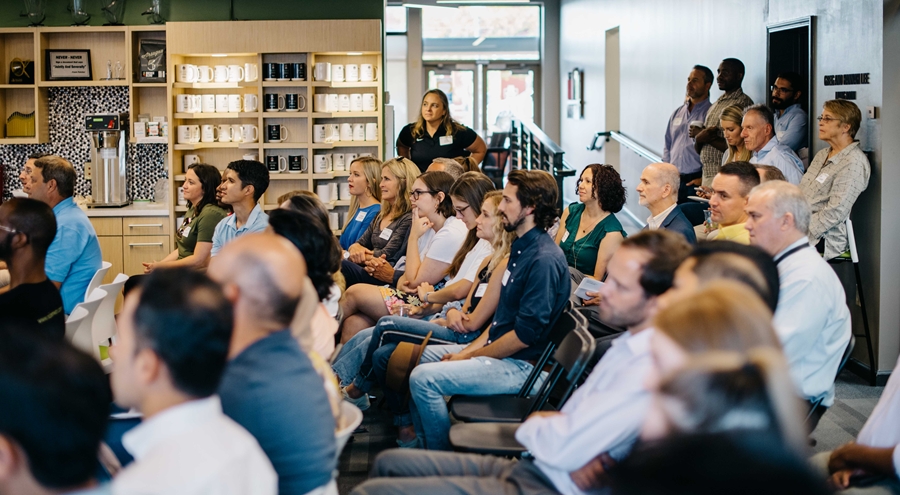
On Thursday, Aug. 29, the Office of Entrepreneurship and Innovation hosted the fall kick-off event for its third annual Social Innovation Challenge. In an effort to offer students the opportunity to engage in creative social entrepreneurship experiences, the Social Innovation Challenge connects a multidisciplinary network of classes with local, national, and international organizations committed to addressing pressing social and environmental problems.
The Office of Entrepreneurship and Innovation consults with organizations to identify challenges falling under four umbrella topics relevant to Northwest Arkansas: food insecurity, affordable housing, job skill development, and sustainability. Faculty members choose from this pool of challenges based on the goals and learning objectives they have for their classes. Students enrolled in these classes work on the development of viable, sustainable, and scalable solutions to these problems. The top proposals are selected for a final event at the end of the fall semester. Winning proposals grant students the opportunity to travel to the conference of their choice, on any of the topics related to their proposal.
The goal of the Social Innovation Challenge is to create awareness of the nature and complexity of these problems. The office believes studying successful social enterprises is a way to establish synergies, inspire students, and consolidate a social enterprise movement in our region.
The Sustainability Consortium, a global organization with a mission to improve the sustainability of companies, is one organization within the partner network. "This partnership will be a collaborative effort that will help inspire ideas that can lead to tackling some of the world's biggest supply chain sustainability challenges," says Sarah Lewis, TSC's senior director of innovation. "Ideas inspire ideas, so we are excited to see what innovative ideas come out of this collaboration to provide solutions for companies as they work to improve product sustainability."
The proposed challenges are connected to the United Nation's Sustainable Development Goals at a local and global scale. These 17 goals address relevant issues including responsible consumption and production, climate action, and reduced inequalities. TSC has proposed four challenges with major economic and environmental implications. The Food Waste and Hunger Challenge strives for a solution to redirect surplus food in supply chains to food insecurity and rescue organizations. The Wastewater Challenge seeks assistance in advocating for and implementing the proper treatment of wastewater in the textile industry. The Flexible Film Recycling Challenge — Circularity NWA — aims to engage Northwest Arkansas in recovering more of the billions of pounds of postconsumer film produced in the U.S.
The partnership between TSC and the Social Innovation Challenge aims to propel students into social entrepreneurship. Between its social enterprise and social innovation classes, a sustainability minor, and the Office of Entrepreneurship and Innovation, the university offers ample opportunity for students to engage in social entrepreneurship and to impact some of the most pressing social or environmental problems affecting our world, with an entrepreneurial approach.
Rogelio Garcia-Contreras, director of social innovation at the Office of Entrepreneurship and Innovation, seeks to engage an interdisciplinary group of faculty and students in these efforts.
"Whether they become part of the sustainability minor, participate in the Social Innovation Challenge, conduct their own research, or simply learn more about the outstanding, high-impact work TSC is doing, we all will benefit when our students and faculty learn about and connect to these efforts," he said. "We are all responsible for fulfilling the Sustainable Development Goals."
Contacts
Madison Sutton, director, Social Innovation Program
Office of Entrepreneurship and Innovation
479-799-6656,